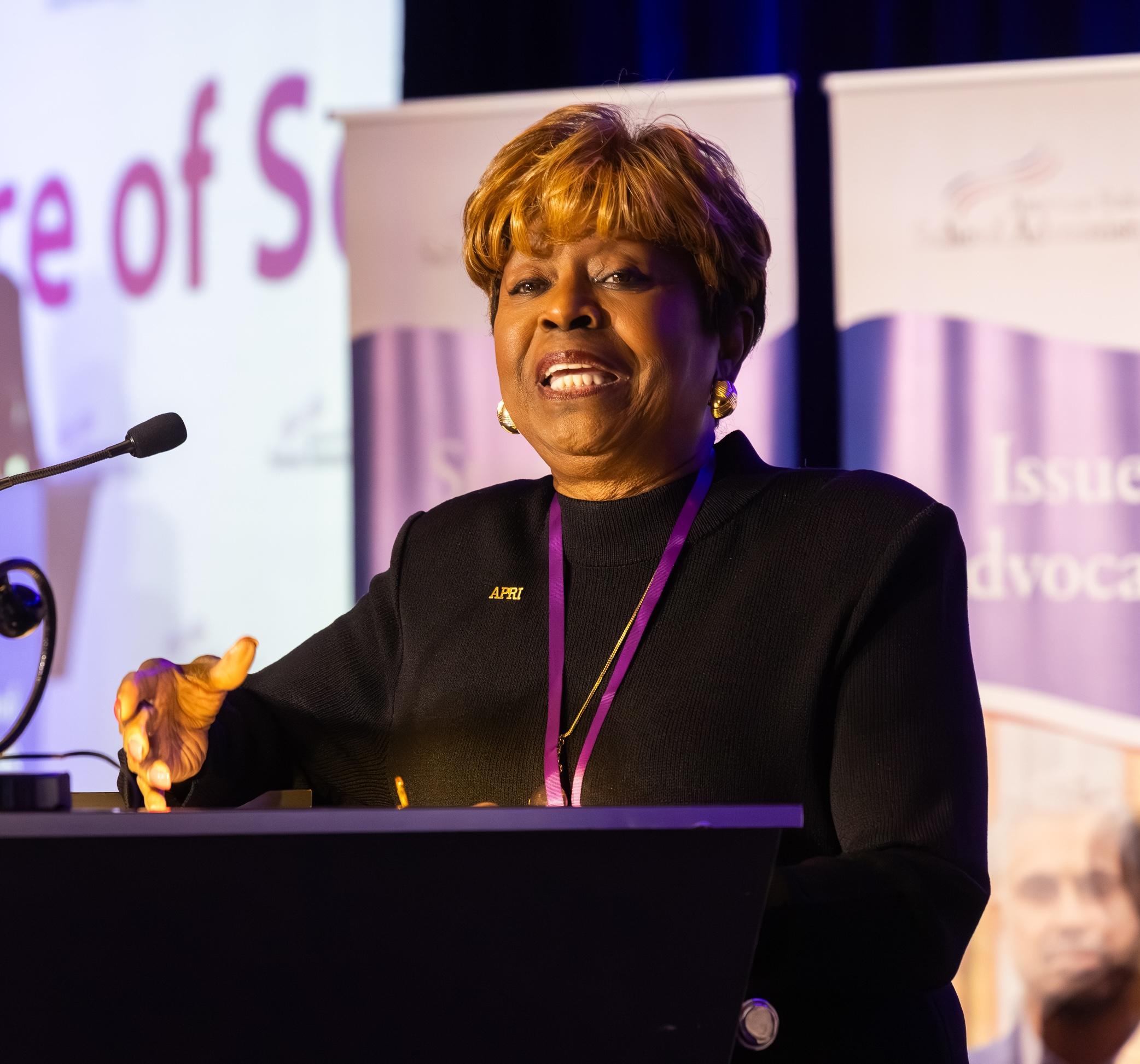Labor and civil rights leader Clayola Brown delivered remarks that left delegates laughing, reflecting and inspired to take action. Blending personal life stories and lessons from labor history, Brown reminded educators that understanding the past is essential for shaping the future—and that mentoring the next generation is both a duty and a privilege.
Brown, president of the A. Philip Randolph Institute (APRI), said, “I feel all special already. I got my fans,” she quipped. “Such a joy to be here. I feel the love. I feel the energy. I feel the growth. I feel all this power. I just feel good.”
Acknowledging her colleagues, she gave a shout-out to AFSA President Emeritus Ernest A. Logan, a member of the AFL-CIO Executive Council, publicly thanking him for his work and emphasizing mutual respect within the labor movement. She also reflected on the role of emeritus colleagues who contributed not for financial gain but to advance APRI’s mission, praising leaders who “bring people into the movement with firm commitment.”
Drawing on the legacy of Randolph, Brown reminded the audience that his organizing brought Black workers into the labor movement. “At a time when many doors were closed, Randolph made sure Black workers had a seat at the table,” Brown said. “He knew the power of words, of connection and of lifting others as you climb.” She emphasized Randolph’s skill as a communicator who engaged directly with workers, making unions feel like home.
Brown highlighted APRI’s dual purpose as a movement and an institute for learning. She described how Pullman porters served as both educators and communicators, carrying not only passengers but vital information across the country. “The porters weren’t just service workers—they were conduits for hope, for opportunity, for life itself,” she said, noting that coded messages often carried crucial information to families and communities, particularly in the South.
She clarified common misconceptions about the 1963 March on Washington, emphasizing that Randolph and organizer Bayard Rustin organized it long before Rev. Dr. Martin Luther King Jr. delivered his famous “I Have a Dream” speech. “History is not just a memory—it’s our guide for action today,” she said, recounting how gospel singer Mahalia Jackson prompted Dr. King to speak from the heart.
Intertwining history with personal reflection, Brown shared stories from her youth. Born a Geechee in South Carolina, she recounted attending the March on Washington at age 15 without parental permission, hiding in a tree to witness history. “You have to be brave, and sometimes that means breaking the rules to see what’s possible,” she said. She also described lessons from her Southern roots: “You know how you learn to travel on a budget? Look for the women with the greasy brown paper bags—they’ve got fried chicken, ham, jelly cake, bottles of tea. That’s culture. That’s care. That’s planning for survival, for sustenance, for each other.”
Brown emphasized the importance of mentorship and collective growth. “It’s not just about you,” she said. “True power lies in lifting others up and growing the movement. Hold your arms open, and you create an army of leaders who will carry this work forward.” She encouraged delegates to bring their gifts to the table and support students, colleagues and communities. “We have to talk to them—not at them—but with them. We are here in support of them. We are collectively here to support that child. If we don’t do that for them, these other forces win.”
The remarks celebrated APRI’s commitment to inclusion and dignity. “Whose business is it who someone loves? We focus on respect, dignity and making sure every voice is heard,” she said, highlighting the organization’s 139 chapters across 36 states. She reminded members that the institute is not just about convening: it’s about teaching, training and returning to communities with knowledge that uplifts others. “Chapter funds are for education, empowerment and growth—not partying,” she joked, drawing laughter while reinforcing the purpose of the union’s work.
Brown’s signature humor and storytelling threaded throughout her remarks. She joked about grammar, family and growing up: “I’m a Geechee from South Carolina. My name combines clay and my aunt Ola. My mother was sharp-tongued, my aunt was sweet—you do the math!” She shared the energy of call-and-response, making the audience her “congregation” and inviting participation as she recited poems. “Come watching you. This is the way. We start that day. We get the knowledge to go to college. We won’t stop there. Oh, anyway, work and smile, because that’s our style. We love each other, help one another, there’s nothing to it, just got to do it. This is the way we start the day,” she led, with delegates responding, “Hey!” and “Amen!”
Her work also emphasized self-love and resilience. “We have to teach ourselves the value we bring. Every child, every worker, every community member is a masterpiece handled with care,” she said. Brown shared the wisdom from her mother: “Dress in love. That’s how we have to dress our children. We have to dress our teachers, our colleagues and our communities in love. Even when they don’t know it, we can show it. That’s ministry.
Delegates said her remarks resonated deeply. “Clayola reminded me why I became an educator,” said one delegate from Oakland, California. “She showed us that understanding our history and mentoring the next generation isn’t optional—it’s the work that sustains our students and our communities.”
Brown closed her remarks by celebrating educators’ dedication and resilience. “Y’all want me to dance?” she asked with a grin, eliciting laughter. She recited her poem "You’re Just Too Much," recognizing the fullness of the audience: “I could add this and that, metaphors and similes, still I can’t capture all of you… You are just too much.”

